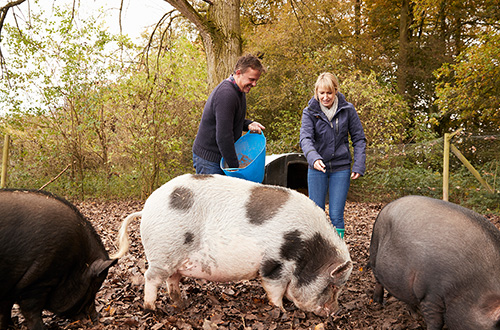Concerned about how Inheritance Tax could affect you? It may be time to consider lifetime gifts
With the discussion of Inheritance Tax (IHT) increasing across the news over the last few months, more and more individuals are considering their own exposure to IHT and what steps can be taken to mitigate this.
Each individual is entitled to receive a Nil Rate Band that is exempt from IHT. Currently, this is £325,000 and this is expected to remain the case until at least the 2027/28 tax year. If an individual’s estate exceeds this amount, the excess could be liable to IHT at the rate of 40%. Additional reliefs are available such as the Spousal Exemption and the Residential Nil Rate Band.
An extremely tax efficient way of reducing your potential exposure to IHT is through making lifetime gifts. This can be done in a variety of ways, some of which are explained in further detail below.
For an overview of IHT, read our article A quick guide to Inheritance Tax.
What is a lifetime gift and will I pay tax on it?
A lifetime gift, by its namesake, is a gift that is made during the lifetime of the donor. Whether you need to pay tax on a lifetime gift depends on what assets have been transferred and who receives the gift. There are three types of transfers for IHT purposes which I detail below.
Please note that it is advisable that you keep records of all gifts made within the previous seven years to ensure that all available exemptions are properly applied to your estate.
Exempt transfers
There are several exempt transfers that can be utilised to reduce an individual’s estate. These are discussed in further detail below.
Spousal exemption
Gifts to a spouse or civil partner are exempt from IHT. However, if the receiving spouse or civil partner does not have a UK domicile, this exemption is limited to £325,000. Any excess of this amount could be subject to lifetime tax at the rate of 20% and, if the UK domiciled donor dies within seven years, any excess could be subject to IHT as high as 40%.
Gifts to UK/EEA charities
Gifts to charities in the UK or European Economic Area are exempt from IHT, whether made during lifetime or on death. This is a great option if an individual for whatever reason doesn’t wish to make gifts to a friend or family member.
Marriage gifts
Making a gift to a family member or friend upon their marriage is exempt up to a limit depending on who is making the gift. These limits are for:
- parents, the limit is £5,000
- grandparents, the limit is £2,500
- anyone else, the limit is £1,000.
Any excess of these amounts could become subject to IHT.
Small gifts
An individual is able to make small gifts totalling a maximum of £250 per individual per tax year. However, if the amount gifted exceeds £250 during a tax year, the entire amount could become subject to IHT.
Annual exemption
Much like the Nil Rate Band, every individual receives an annual exemption. Currently, this is for £3,000 per tax year. If an individual has not utilised their previous year’s annual exemption, the previous year’s unused exemption can be brought forward and utilised, but only once the current year’s exemption has been fully utilised.
Gifts out of regular income
It is possible for an individual to make payments in excess of the £3,000 annual exemption without giving rise to an IHT liability. This is known as making gifts out of regular income and for a gift to qualify for this exemption, an individual must meet all of the following conditions:
- It must be the individual’s intention for the gifts to form a pattern; and
- The gift must be made out of income generated during the current tax year; and
- Any gifts must not reduce the donor’s standard of living.
If these gifts qualify for this exemption, they will not be caught by the seven-year rule. However, upon the death of the donor, all gifts will be considered to ensure that they qualified for this exemption.
As this is an area that HMRC pays particular attention to upon the death of an individual, it is recommended that you seek professional advice before making your initial gift.
Potentially exempt transfers
Making a gift to an individual who is not your spouse or civil partner is considered a Potentially Exempt Transfer (PET) for IHT purposes. This means that no immediate charge to IHT will arise on the gift. PETs can be an extremely tax efficient way of reducing your estate and passing assets onto members of your family or friends.
However, if the donor were to die within seven years of the gift, this would then become chargeable and if the value exceeds their available Nil Rate Band, the excess could potentially be subject to IHT at 40% and this amount would be payable by the donee.
If the donor survives at least three years of the gift, taper relief would be available to reduce the amount of tax payable by the recipient of the gift. The taper relief that could apply is as follows:
| Number of years since making the gift | Tax rate potentially payable |
| 0 – 3 years | 40% |
| 3 – 4 years | 32% |
| 4 – 5 years | 24% |
| 5 – 6 years | 16% |
| 6 – 7 years | 8% |
| 7 + years |
0%
|
Chargeable lifetime transfers
Most settlements into a trust are Chargeable Lifetime Transfers (CLTs). If an individual makes a CLT into a trust and the value exceeds their available Nil Rate Band, the excess will be subject to Lifetime Tax at the rate of 20%.
Much like PETs, if the donor were to die within seven years of the CLT, this could then become subject to IHT at the higher rate of 40%. Taper relief would still be available as explained above and any Lifetime Tax paid would reduce the amount of tax that is due. However, the Lifetime Tax cannot reduce the tax due below nil.
Gifts with reservation of benefit and pre-owned assets tax charge
When an individual makes a gift but continues to receive a benefit from the asset, or cash gifted is used to purchase an asset that the donor benefits from, this could give rise to additional IHT and Income Tax consequences.
Paying into children’s and grandchildren’s pensions from birth
An increasingly popular method for reducing an individual’s Estate has been for parents and grandparents to make contributions into pension schemes for their children. Figures from HMRC show that the number of pension schemes for under-18s that received money rose by 52% between the 2018/19 and 2020/21 tax year.
Only a parent or guardian can set up a pension scheme for their child, but once opened anyone is able to contribute into it. There is no minimum age for a child to have a pension scheme, they are able to have a scheme from birth.
The maximum contribution you can make to a child’s pension for the 2023/24 tax year is £2,880 net. Much like an adult’s pension, any contributions are grossed up by the government by 20%, so £3,600 gross. In the future, if your child becomes a higher or additional rate taxpayer, tax relief will be available through self-assessment on any future contributions.
By making yearly contributions to a child’s pension, these gifts could utilise their Annual Exemption or, if you are making contributions for more than one child, they could qualify as Gifts out of regular income.
Finally, talking about IHT can be a daunting task, but without taking proper advice, elements of your estate could be subject to IHT at the rate of 40%. Ensuring that you have prepared a valid will is imperative when planning for the future. If you have not currently prepared a will or your present will is some years old, it makes sense to review the position to make the most of any tax efficiencies that may be available.
Get in touch
This article provides only a brief overview of Lifetime Gifts. IHT can be complex, so seeking professional advice is advisable. Tax laws and regulations are subject to change, so it's crucial to consult with a professional or refer to the latest HMRC guidance for the most up-to-date and accurate information. To discuss your specific circumstances further, please get in touch.
If you have any questions about the above, or would like more information specific to your circumstances, please enter your email address below and we will get in touch:













